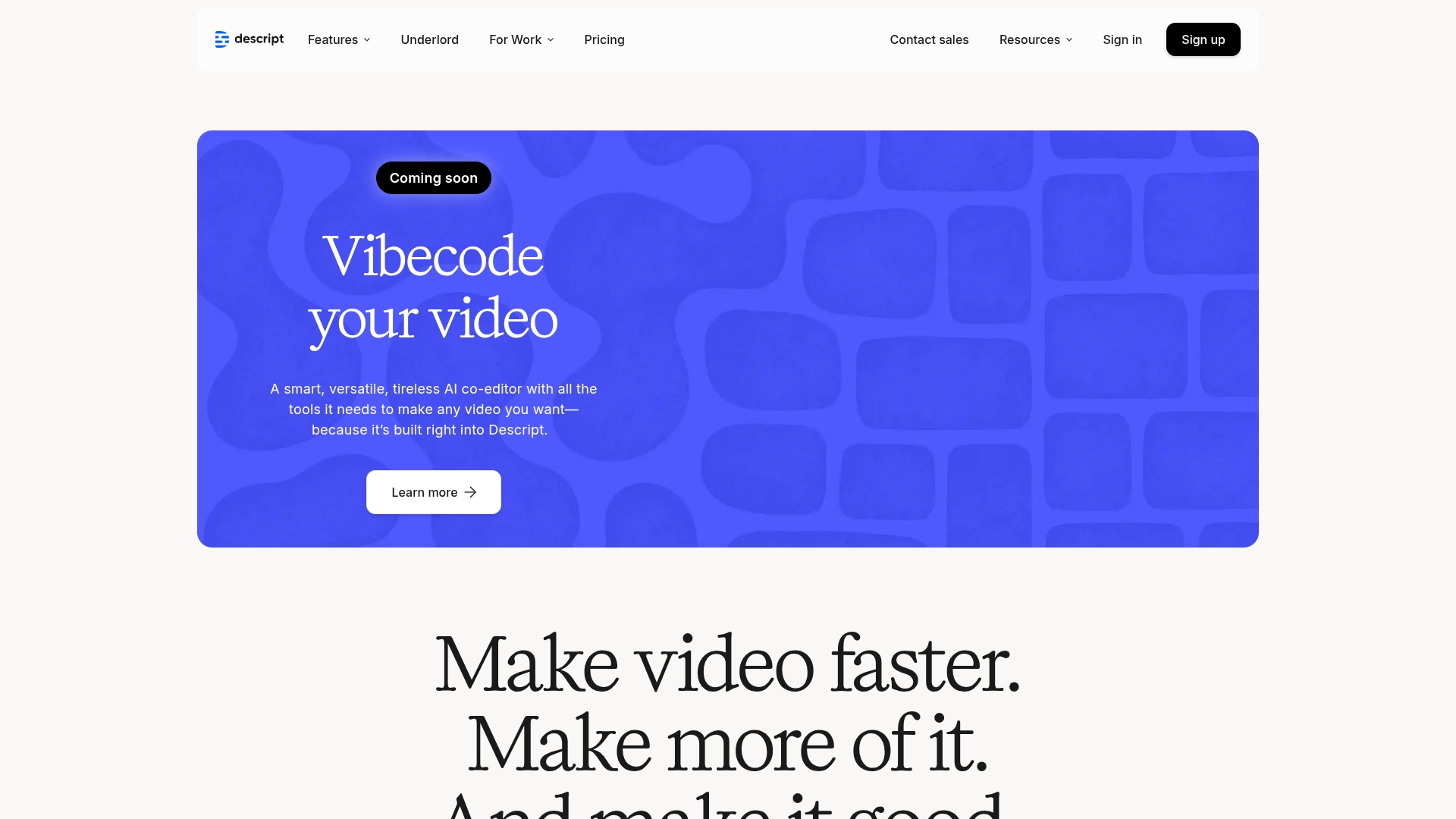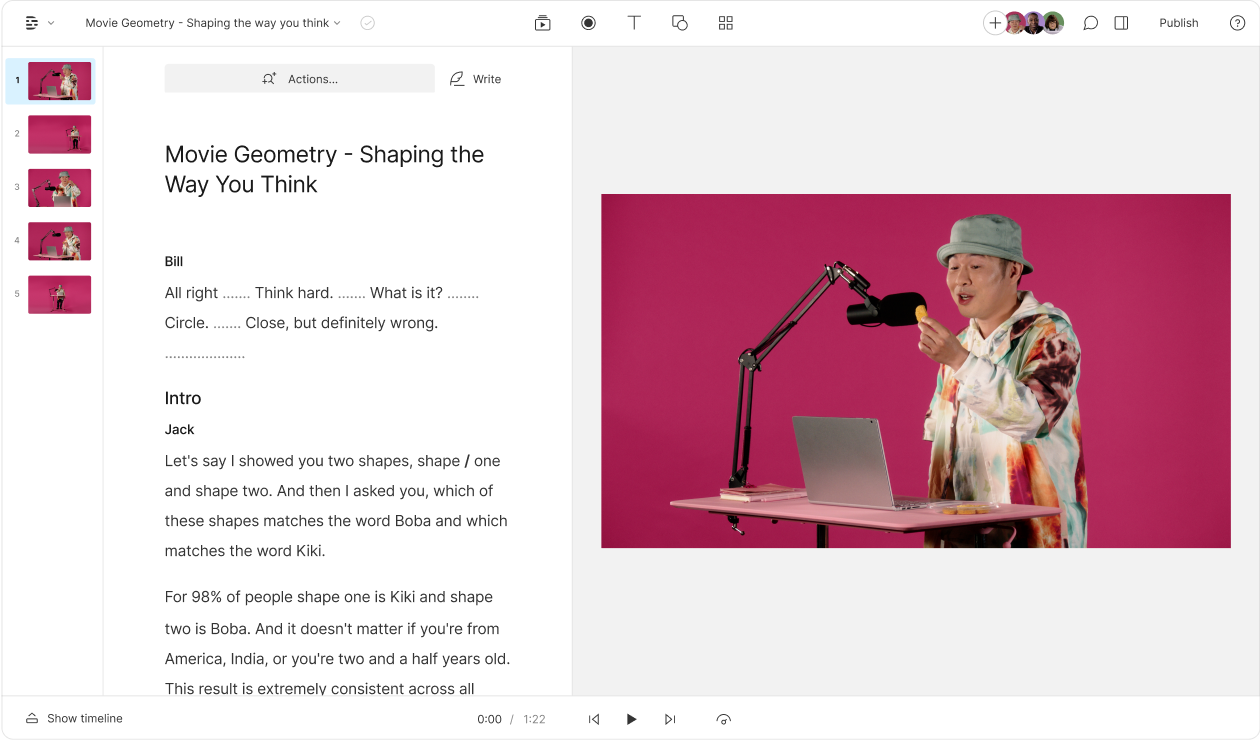What type of content do you primarily create?




We've all been there—scrubbing through a two-hour webinar just to find that one crucial point you need. It's maddening. Today's AI video summarizers are changing that game completely. They scan what would take you hours to watch and serve up just the highlights you need in seconds. No more wasted afternoons—just the good stuff.
Key takeaways
These new AI tools cut through the noise fast—what once took all day now happens with a few clicks.
Say goodbye to frantically scribbling notes or rewinding sections five times. These tools turn your unwatched video backlog into a searchable resource you'll actually use.
Descript stands out by integrating powerful summarization directly into its text-based editing workflow, creating a seamless experience where editing and summarizing happen in one place.
Top video summarizer tools in 2025
1. Descript
Descript flips the script on video editing—literally. You tweak the text, and the video edits itself. But that's just the start. After transcribing your footage, its AI helps you pull out summaries, generate show notes, tag key moments, and even craft social posts. It's like having a production assistant who actually watched your video and gets what matters.

Best For:
Content creators, educators, and teams who want integrated editing and summarization in one platform.
Key Features:
Automatically generates concise summaries, podcast show notes, and blog posts from your video or audio.
AI-driven tools find and extract the best segments for social media clips with features like "Make Clips."
Text-based editing lets you edit video by simply editing the transcript, with AI removing filler words or retakes.
Pros:
All-in-one platform combines editing, transcription, and AI-powered summarization in a single workflow.
User-friendly AI features work intuitively without requiring technical expertise.
Strong collaboration tools let teams work together on projects and review AI-generated summaries.
Cons:
Advanced AI actions like extensive use of AI voices require higher-tier plans.
The full editing toolkit presents a learning curve for users accustomed to traditional timeline editing.
Free plan offers limited summarization features and watermark-free exports.
Pricing:
Free: $0/month - 1 transcription hour/month, 5 uses of Basic AI Suite, 720p watermarked exports.
Hobbyist: $12/person/month (annual) - 10 transcription hours/month, 20 uses/month of Basic AI Suite, 1080p watermark-free exports.
Creator: $24/person/month (annual) - 30 transcription hours/month, Unlimited AI Suite, 4k watermark-free exports.
Business: $40/person/month (annual) - 40 transcription hours/month, Unlimited Professional AI Suite, priority support.
2. Notta
Notta specializes in transcription and summarization for meetings and recordings. It converts spoken content into text and then distills that text into concise summaries. The platform excels at capturing key points from lengthy discussions, making it perfect for teams who need quick meeting recaps.

Best For:
Teams who need quick audio-to-text transcription with summaries for meetings and interviews.
Key Features:
Real-time transcription captures live events or uploaded files with high accuracy.
Supports transcription and summarization across 58 languages for global teams.
Generates structured summaries with action items and chapter-like organization.
Pros:
Delivers high accuracy in speech recognition even with multiple speakers.
Simple interface focuses on transcription without unnecessary complexity.
Multilingual support makes it valuable for international teams and content.
Cons:
Lacks video editing capabilities beyond basic transcription and summarization.
Advanced summarization features require paid plans.
Requires stable internet connection for web app functionality.
Pricing:
Free: $0/month - Limited to 20 free online meetings (signup offer).
Pro: Price not specified - Includes AI Summary Generator and custom templates.
3. Monica
Monica serves as an all-in-one AI assistant that summarizes various content types, including YouTube videos. Its browser extension provides one-click summarization, and it stands out by creating visual mind maps from summaries. This visual approach helps users understand relationships between concepts in the content.

Best For:
Visual learners who want mind-mapping summaries alongside text for better comprehension.
Key Features:
Summarizes web pages, PDFs, and YouTube videos into paragraphs or bullet points.
Creates AI-generated mind maps that visualize relationships between concepts.
Offers chat-based Q&A to explore summarized content more deeply.
Pros:
Visual mind maps provide unique perspective on content structure.
One-click browser extension makes summarization effortless.
Timestamped outlines for YouTube videos help navigate long content.
Cons:
No video editing functionality beyond summarization.
Premium features like complex mind maps require paid plans.
Summary quality varies based on the underlying AI models.
Pricing:
Free: $0 - 40 daily accesses to basic models, limited YouTube summarization.
Pro: $8.3/month (annual) - 200 monthly accesses to advanced models, 1500 Advanced Credits.
Unlimited: $16.6/month (annual) - Unlimited access to advanced models, 4500 Advanced Credits.
4. Jasper
Jasper built its reputation as an AI writing assistant for marketing content but has expanded to include video script summarization. The platform excels at condensing scripts into concise summaries while maintaining brand voice. Its marketing focus makes it ideal for teams creating promotional content.

Best For:
Marketing teams who want AI-driven copy, video scripts, and summaries in one platform.
Key Features:
Advanced AI text generation creates summaries from video scripts in your brand voice.
Brand Voice feature ensures summaries match your company's tone and style.
Supports over 30 languages for global marketing teams.
Pros:
Marketing-focused templates align summaries with other promotional materials.
Strong brand voice customization maintains consistent messaging.
Efficiently repurposes video content into various text formats.
Cons:
Summarizes scripts, not video directly, requiring transcripts first.
More complex and expensive than needed if you only want summarization.
Quality depends heavily on the detail in your original video script.
Pricing:
Creator: $39/month/seat (annual) - 1 Brand Voice, Jasper Chat for summarization.
Pro: $59/month/seat (annual) - 3 Brand Voices, 10 Knowledge assets for factual summaries.
Business: Custom pricing - Unlimited Brand Voices and Knowledge assets.
5. Wordtune
Wordtune focuses on refining language in text. While not a dedicated video tool, it excels at summarizing and improving video transcripts. The platform helps users adjust the length, tone, and clarity of text-based summaries, making it valuable for polishing transcribed content.

Best For:
Users who want AI generation and editing for text-based summaries from video transcripts.
Key Features:
Real-time sentence rephrasing suggests better ways to express ideas.
Adjustable summary length creates concise or detailed versions as needed.
Browser extension works across websites for quick summarization.
Pros:
Helps refine language as well as summarize content.
Creates short, punchy summaries perfect for social media.
Minimal setup with browser extension makes it immediately useful.
Cons:
Primarily text-based with no direct video processing.
Summaries rely entirely on transcript quality without video context.
Free tier offers very limited summarization capabilities.
Pricing:
Basic: $0/month - 3 AI Summaries per month, 10 rewrites/day.
Advanced: $4.89/month (annual) - 15 AI Summaries per month, 30 rewrites/day.
Unlimited: $6.99/month (annual) - Unlimited AI Summaries and rewrites.
6. Mindgrasp
Mindgrasp targets the education sector, transforming lecture videos and notes into interactive study materials. The platform creates summaries, flashcards, and quizzes from educational content, focusing on knowledge retention and academic understanding rather than general summarization.

Best For:
Students and researchers who need to extract key points from academic or research-heavy videos.
Key Features:
AI-generated detailed summaries from educational videos and lectures.
Automatically creates study aids like flashcards and quizzes from content.
Integrates with learning management systems through Chrome extension.
Pros:
Built specifically for academic use with structured, educational summaries.
Focuses on ethical AI use that enhances learning without enabling cheating.
Supports multiple output formats from a single video source.
Cons:
Interface may feel complex for casual users outside academia.
Academic focus limits appeal for general video summarization.
Limited collaboration tools compared to team-oriented platforms.
Pricing:
Basic: $5.99/month (annual) - Unlimited AI summaries and notes from uploads.
Scholar: $8.99/month (annual) - Adds AI Math Expert, Chrome Extension, iOS app.
Premium: $10.99/month (annual) - Adds batch uploads, AI image analysis.
7. ScreenApp
ScreenApp combines screen recording with AI-powered transcription and summarization. The platform lets users capture content and immediately generate notes and summaries from those recordings. Its web-based approach makes it accessible without installing software.
Best For:
Quick online screen recordings with immediate summary features.
Key Features:
One-click screen, audio, and video recording directly in browser.
Automatic transcript generation from recorded or uploaded content.
AI-powered summarization creates notes from transcripts.
Pros:
Fast screen recording without heavy software installation.
Web-based platform works across devices.
Customizable summary formats adapt to different needs.
Cons:
Editing features remain minimal beyond basic recording.
Summaries depend on transcript quality without deeper video analysis.
Free plan significantly limits recording time and AI features.
Pricing:
Free: $0/month - 3 AI Credits, 1 transcription/month, 3 recordings (45 mins max).
Growth: $14/month (annual) - 600 AI Credits/year, 600 transcriptions/year.
Business: $34/month (annual) - Unlimited AI generations and recordings.
Wrapping up your summarizer toolkit
These tools each tackle video differently. Monica creates visual mind maps, Jasper nails marketing angles, and most start with solid transcription as their foundation. If you hate app-switching, Descript is your best bet—it combines serious editing tools with smart summarization under one roof. You can take raw footage and turn it into finished videos, complete with summaries and social clips—all without leaving the app. As 2025's AI race heats up, expect these tools to add even smarter features—think auto-generated B-roll suggestions and audience engagement predictions.
Get started today
Make your workflow easier and faster by signing up for Descript Free Trial. Put time-consuming editing tasks on autopilot while you focus on meaningful storytelling. While you're crafting your message, Descript's AI is busy in the background—trimming dead air, fixing audio hiccups, and prepping your distribution assets.
Pro tips for getting the most out of video summarizers
Keep your scripts tight: The clearer the transcript, the better the AI summary. Clean audio and well-structured content yield superior results.
Sync with your favorite apps: Use integrations (Zoom, Google Drive) to import videos seamlessly. Most tools connect with popular platforms to streamline your workflow.
Automate highlight reels: Let AI pinpoint the exciting bits and skip the mundane. Tools like Descript can identify key moments and create clips automatically.
Frequently asked questions about video summarizers
How do I choose the right tool for my needs?
Figure out what matters most to you—do you need the smartest AI, visual mind maps, or marketing-ready copy? Choose a tool that fits how you already work, not one that forces you to change everything. If you need deep video editing alongside summarization, choose an all-in-one solution like Descript. For simple text summaries, a more focused tool might work better.
Is a video summarizer worth the investment?
Absolutely worth it if you're drowning in video content. Even the free plans can save you hours each week. One creator I know turned a 3-hour podcast edit into a 45-minute job—that kind of time-saving pays for itself.
Can I switch between these tools easily?
You can. Export transcripts or final summaries into standard text files, then import into another platform without major issues. Most platforms support common formats like .txt, .docx, or SRT for captions, making transitions relatively smooth.























%201.svg)





